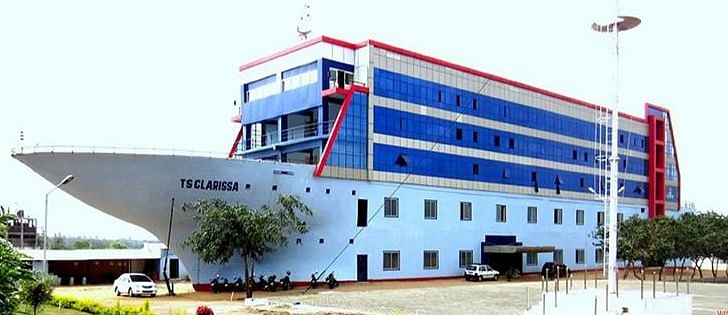BSc Nautical Science Syllabus and Subjects 2026

BSc Nautical Science subjects mainly focus on core areas such as Marine Engineering and Control Systems, Navigation, Seamanship, Maritime Law, Voyage Plan and Collision, etc. The students are also required to choose the elective subjects for each semester such as Oceanography, Cargo Handling, Fire Safety Measures, Meteorology, Ship Management, etc.
The BSc Nautical Science syllabus is divided into six semesters and focuses on equipping the students with theoretical and practical knowledge on navigating marine vehicles. The syllabus varies based on the institution or university however the structure remains the same which covers core topics such as navigation, seamanship, maritime operations, etc.
BSc in Nautical Science Course mainly trains students to operate and navigate marine vehicles such as ships, containers, cargo, etc. The course also prepares the students to handle shipboard tools such as Automatic Tracking Aids, Speed and Distance Log Devices, Echo Sounders, Gyro Compass, etc.
Table of Contents
BSc Nautical Science Subjects
BSc Nautical Science course subjects are focused on equipping the students with the relevant skills required for navigating marine vehicles, deck management, handling emergency situations onshore and offshore etc. The BSc in Nautical Science subjects are classified into two categories such as core and elective subjects, the list of which is given below:
Core BSc Nautical Science Subjects
B.Sc Nautical Science core subjects help students to understand the concepts and foundation of Nautical Science. These subjects are directly related to the job roles and will help the candidates land their dream job. Listed below are the BSc Nautical Science Core subjects:
- Ship Operations Technology
- Nautical Electronics
- Terrestrial Navigation
- Ship Operations Paper- I
- Ship Operations Paper - II
- Naval Architecture Paper -I
- Naval Architecture Paper- II
- Voyage Planning & Collision Prevention
- Voyage Planning & ECDIS
- Bridge Equipment & Watchkeeping Paper -II
- Celestial Navigation Paper - II
- Celestial Navigation Paper - I
- Ship Stability Paper - I
- Ship Stability Paper - II
B.Sc Nautical Science Elective Subjects
Based on the student's area of interest, scope of Higher Education and career opportunities candidates can choose the BSc Nautical Science Elective subjects of their choice. Following is the list of elective subjects
- Environmental Science
- Marine Engineering Control System
- Life Saving & Fire Fighting Appliances
- Meteorology
- Shipping Management
- Ship Manoeuvring & Collision Prevention Regulations
- Human Resource Management, Development & Leadership
- IMO International Conventions
- Marine Environmental Protection
BSc Nautical Science Subjects in Detail
BSc Nautical Science subjects are focused on training the students with all the relevant skills along with a strong domain knowledge to help them excel in the field of Nautical Science. Below listed are some of the important BSc Nautical Science subjects:
|
BSc Nautical Science Subjects |
Topics |
|
Naval Architecture |
Marine Design, Marine Structure, Meteorology, Engineering Physics. |
|
Ship Operations |
Hydrodynamics, Cavitation, Ship Design, Emission Control, Oil Spill. |
|
Ship Stability |
Introduction to Hydrostatics and Stability of Surface Ship, Mass Displacement, Volume Displacement. |
|
Celestial Navigation Paper |
Voyage Data Recorder, Bridge Navigation Watch Alarm Systems, Ship Security Alert System, SONAR aids, Dynamic Positioning Systems, Berthing Aids. |
|
Voyage Planning & ECDIS |
IMO Performance standard for ECDIS, the Difference between ENC and SENC, Safety Contours and Safety Depth, Features of ECDIS, Limitations of ECDIS, Raster Charts, Vector Chart, Simplified Symbols. |
Semester-Wise BSc in Nautical Science Syllabus
BSc in Nautical Science subjects covers all the essential topics related to marine vehicle operations, ship construction, Marine Care and crew management. B.Sc Nautical Science syllabus and subjects are designed based on industry standards. The semester-wise BSc in Nautical Science syllabus is provided below:
First-Year BSc Nautical Science Syllabus
BSc Nautical Science course subjects for the first year include Nautical Physics, Nautical Mathematics, Ship Construction etc. This will help the students understand the foundation and fundamentals of Nautical Science. Tabulated below are the BSc in Nautical Science syllabus for First Year:
|
Semester I |
Semester II |
|
English |
Applied Mathematics |
|
Nautical Mathematics |
Applied Physics & Electricity |
|
Nautical Physics |
Ship Operations Technology |
|
Computer Science |
Nautical Electronics |
|
Terrestrial Navigation |
Ship Constructions |
|
General Ship Knowledge |
Chart Work & Collision Prevention Regulations |
|
- |
English Communication Lab |
Practical Topics in BSc Nautical Science First Year Syllabus
The following are the practical topics included in the semester I and II of the B.Sc Nautical Science First Year Syllabus:
- Nautical Physics
- Computer Science
- Applied Physics & Electricity
- Nautical Electronics
Second-Year BSc Nautical Science Syllabus
BSc in Nautical Science subjects for the second year focuses on training the students on automation and control systems of the marine engine, industry standards, cargo handling etc. The following are the second-year B.Sc Nautical Science subjects:
|
Semester III |
Semester IV |
|
Celestial Navigation Paper-I |
Life Saving & Fire Fighting Appliances |
|
Marine Engineering, Automation & Control Systems Paper –I |
Celestial Navigation Paper-II |
|
Ship Stability Paper - I |
Ship Stability Paper - II |
|
Environmental Studies |
Cargo Handling and Storage Paper-II |
|
Cargo Handling and Storage Paper-I |
Meteorology |
|
Bridge Equipment & Watchkeeping Paper –I |
Bridge Equipment & Watchkeeping Paper –II |
Practical Topics in BSc Nautical Science Second Year Syllabus
The following are the practical topics included in semesters III and IV of the B.Sc Nautical Science Second Year Syllabus:
- Seamanship Lab - I
- Marine Engineering Workshop -I
- Seamanship Lab - II
- Marine Engineering Workshop -II
Third-Year BSc Nautical Science Syllabus
BSc Nautical Science course subjects for the third year focus on training the candidates on practical aspects such as Ship Maintenance and Emergencies, Marine Environmental Protection, Collision Prevention etc. Tabulated below are the BSc in Nautical Science subjects for the third year:
|
Semester-V |
Semester- VI |
|
Coastal Navigation & Collision Prevention Regulations |
Voyage Planning & ECDIS |
|
Ship Maintenance and Emergencies |
Naval Architecture Paper - II |
|
Specialised Cargo Handling & Storage |
IMO & International Conventions |
|
Naval Architecture Paper - I |
Human Resource Management, Development & Leadership |
|
Shipping Management |
Ship Manoeuvring & Collision Prevention Regulations |
|
Bridge Equipment & Watchkeeping Paper -II |
Marine Environmental Protection |
Practical Topics in BSc Nautical Science Third Year Syllabus
The following are the practical topics included in semesters V and VI of the B.Sc Nautical Science Third Year syllabus:
- Ship Operation Technology Lab
- Navigation Lab
College-Wise BSc Nautical Science Syllabus
BSc Nautical Science subjects and syllabus vary from one college to another depending on the curriculum and program objectives. Candidates can refer to the official website of the college or university to download the BSc Nautical Science syllabus of a particular college. Given below are the BSc in Nautical Science syllabus for top colleges:
Tolani Maritime Institute B.Sc Nautical Science Syllabus
The BSc in Nautical Science syllabus at Tolani Maritime Institute includes subjects such as celestial navigation, ship operations technology, voyage planning etc. The following tables show the semester-wise syllabus for BSc Nautical Science:
|
Semester-I |
Semester-II |
|
English and Communication Skills |
Applied Physics & Electricity |
|
Nautical Mathematics |
Applied Mathematics |
|
Nautical Physics |
Nautical Electronics |
|
Computer Science |
Ship Construction |
|
General Ship Knowledge |
Chart Work & Collision Prevention Regulations |
|
Terrestrial Navigation |
Ship Operations Technology |
|
Nautical Physics (Practical) |
Applied Physics & Electricity (Practical) |
|
Computer Science (Practical) |
Nautical Electronics(Practical) |
|
Semester - III |
Semester -IV |
|
Celestial Navigation Paper -I |
Life Saving & Fire Fighting Appliances |
|
Ship Stability Paper - I |
Ship Stability Paper-II |
|
Marine Engineering, Automation & Control Systems Paper – I |
Cargo Handling & Stowage Paper –II |
|
Meteorology Paper - I |
Ship Maintenance & Emergencies |
|
Cargo Handling & Stowage Paper –I |
Marine Engineering, Automation & Control Systems Paper – II |
|
Bridge Equipment & Watchkeeping Paper –I |
Meteorology Paper-II |
|
Seamanship Lab- I (Practical) |
Seamanship Lab - II (Practical) |
|
Marine Engineering Workshop - I (Practical) |
Marine Engineering Workshop - II (Practical) |
|
Semester-V |
Semester-VI |
|
Coastal Navigation & Collision Prevention Regulations |
Voyage Planning & ECDIS |
|
Naval Architecture Paper-I |
Naval Architecture Paper-II |
|
Celestial Navigation Paper –II |
Ship Manoeuvring & Collision Prevention Regulations |
|
Specialised Cargo Handling & Stowage |
IMO & International Conventions |
|
Shipping Management |
Human Resource Management, Development & Leadership |
|
Bridge Equipment & Watchkeeping Paper -II |
Marine Environmental Protection |
|
Ship Operation Technology Lab (Practical) |
Ship Operation Technology Lab (Practical) |
West Bengal University of Technology BSc Nautical Science Syllabus
Indian Maritime University BSc Nautical Science subjects and syllabus cover all the aspects of nautical science including cargo management, Principles of Navigation, Shipping operations and technology etc. Given below are the semester-wise BSc Nautical Science syllabus:
|
Semester-I |
Semester-II |
|
English & Communication Skills |
Applied Mathematics Paper – II |
|
Applied Mathematics Paper-I |
Nautical Physics & Electronics Paper –II |
|
Nautical Physics & Electronics Paper –I |
Voyage Planning & Collision Prevention Paper – I |
|
Principles of Navigation Paper-I |
Cargo Work & Marine Communication Paper – I |
|
Naval Architecture Paper-I |
Environmental Science Paper – I |
|
Ship Operation Technology Paper – I |
Marine Engineering & Control System Paper – I |
|
Semester-III |
Semester-IV |
|
Applied Mathematics Paper – III |
Computer Science |
|
Nautical Physics & Electronics Paper –III |
Applied Mathematics Paper – IV |
|
Voyage Planning & Collision Prevention Paper – II |
Nautical Physics & Electronics Paper – IV |
|
Bridge Procedure & Legal Knowledge |
Principles of Navigation Paper II |
|
Environmental Science Paper-II |
Ship Operation Technology Paper – II |
|
Marine Engineering & Control System Paper – II |
Naval Architecture Paper-II |
|
Semester-V |
Semester-VI |
|
Principles of Navigation Paper – III |
Principles of Navigation Paper – IV |
|
Ship Operation Technology Paper – II |
Ship Operation Technology Paper – III |
|
Naval Architecture Paper-III |
Voyage Planning & Collision Prevention Paper – III |
|
Environmental Science Paper – III |
Shipping Management |
|
Maritime Law |
Marine Engineering & Control System Paper – III |
BSc Nautical Science Project Topics
BSc Nautical Science projects will help students understand the practical aspects of the syllabus. Following are some of the topics the students can choose based on their preferences:
- Design of Marine Reverse Reduction Gearing
- Boiler Combustion Control-Selection & Design of System for a Marine Boiler
- The Study of Split Cycle in Diesel Engine
- Study, Analysis and Design of Marine Engine Component
- Investigation on Heat Transfer Performance of Particle Dispersed PCM
- Wind Energy: The Renewable Source of Energy for Merchant Ships
- Feasibility Study of Fuel Cells in the Maritime Industry
- Use of Novel Material in Shipbuilding
BSc Nautical Science Course Structure
BSc Nautical Science course structure is a blend of both theoretical and practical aspects of Nautical science based on industry standards to help the candidates understand the concepts better. The following is the BSc Nautical Science course structure, which includes:
- Six Semester
- Core and Elective Subjects
- Projects
- Workshops and Seminars
- Pre-Sea Training
BSc Nautical Science Books
The BSc Nautical Science Course covers a wide range of topics such as navigation, ship operation, naval architecture, etc. Here are some of the top book references that cover the topics included in the BSc Nautical Science syllabus to gain a better insight.
|
Reference Books |
Author |
Topics Covered |
|
Seamanship and Cargo Work |
Cap.J.Dinger |
Meteorology and Forecasting, Deck Handling, International Maritime Law and Regulatory Knowledge, etc. |
|
Shipboard Operations |
H I Lavery |
Ship and Small Boat Operations, Rope Work and Line Handling, Pillars of Seafarers, etc. |
|
A Guide to Collision Avoidance Rules |
A.N. Cockcroft & J.N.F. Lameijer |
Collision Avoidance Rules, Safety Operations of Ships, International Regulations for Collision Prevention at Sea, etc. |
|
Ship Stability for Masters and Mates |
Bryan Barrass |
Ship Stability, Deck Management, Ship Strength, Material Stresses and Forces, Interaction and Trim, etc. |
|
Ship Handling – Theory and Practice |
David.J.House |
Ship Handling Manual, STCW Level Marine Qualifications, Ship Handling Procedures, etc. |
Top BSc Nautical Science Colleges
Top Science Entrance Exams
BSc Nautical Science Fee Structure
FAQs on BSc Nautical Science Syllabus and Subjects
Q: Is there maths in BSc nautical science?
Q: Is the Merchant Navy Exam difficult?
Q: Which stream is best for the Navy?
Q: What is the practical training component of the program?
Q: How to stay updated with the advancements in maritime technology?
Q: What is the importance of meteorology in BSc Nautical Science?
Q: What kind of safety training is a part of the BSc Nautical Science syllabus?
Q: Is the BSc Nautical Science syllabus tough?






















